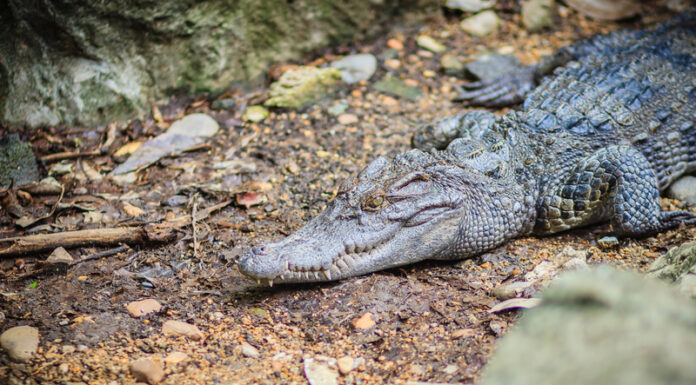A tragic incident unfolded in the Wali River, Maluku, Indonesia, when a 54-year-old grandmother, Halima Rahakbauw, was attacked by a crocodile as she was washing dishes. The attack occurred in the morning hours while she was tidying up her kitchenware after a meal.
Halima, who lived in a village close to the river, had gone to the river early that morning to gather shellfish and wash dishes, as shared by her family members. Her relative, Jamia Seknun, informed that Halima left early fearing the river level might rise by midday.
Around 10:30 a.m., a man named Ali Rahangmetan, who was crossing the Wali Bridge, noticed an unusual stir in the water. Initially, he assumed it to be someone swimming. However, his observation turned into a horrifying reality as he described, “I saw someone swimming, but I couldn’t see their body. Only their legs were visible. To make sure, I went out of my car and finally saw that it was a human being eaten by a crocodile. I couldn’t tell if it was a man or a woman. Only the legs and intestines of the person were visible.”
Immediately after this sighting, Ali informed the local law enforcement, who initiated an urgent search for Halima. Her family had already reported her missing when she failed to return home after her morning visit to the river. The police, in their frantic search, located the female crocodile, measuring about 14 feet, that was responsible for the attack and was still in the process of consuming Halima’s body.
The authorities took swift action and killed the crocodile. With the assistance of local villagers, they managed to recover Halima’s remains from the crocodile’s stomach. Witnesses reported seeing “a leg hanging out of its mouth” when the crocodile was apprehended.
Indonesia is home to several crocodile species, including the notoriously aggressive saltwater crocodile. Overfishing and habitat loss have been driving the crocodile population closer to human settlements in recent years. The scarcity of natural prey has forced these dangerous reptiles to venture further inland, often resulting in fatal confrontations with humans.
This incident is not unique in Indonesia. Earlier this month, a 40-year-old Australian man, Dave Hogbin, was killed by a crocodile in Far North Queensland while fishing with his family. In another incident in 2018, nearly 300 crocodiles were slaughtered in Papua as an act of revenge after one of the reptiles killed a local man.
As Indonesia continues to develop, many locals still depend on rivers for everyday activities like bathing, fishing, and washing, which increases their susceptibility to crocodile attacks. This is particularly true for rural communities where awareness about these predators and safety measures are often lacking.
The Indonesian government has been urged to establish stronger protective measures and raise awareness to prevent such attacks in the future. However, as human activities continue to encroach upon crocodile habitats, these incidents are likely to continue. Currently, local authorities are investigating the circumstances of Halima’s death and are collaborating with wildlife experts to manage the growing crocodile threat in the region.
The Wali River, once a life-giving source for the local village, has turned into a site of terror. For Halima Rahakbauw’s family, this tragedy serves as a grim reminder of the hidden dangers in the river they have relied on for generations.








